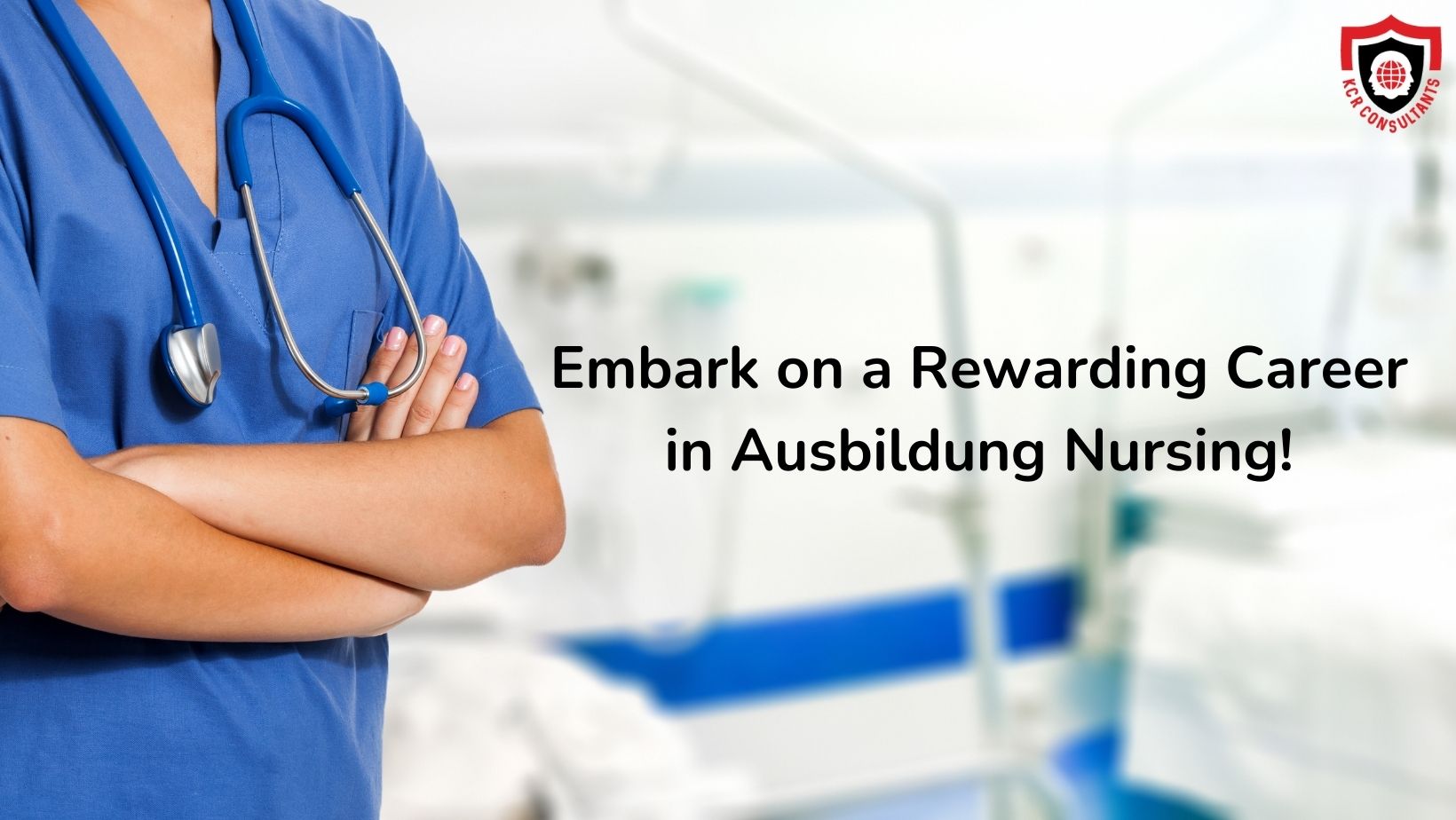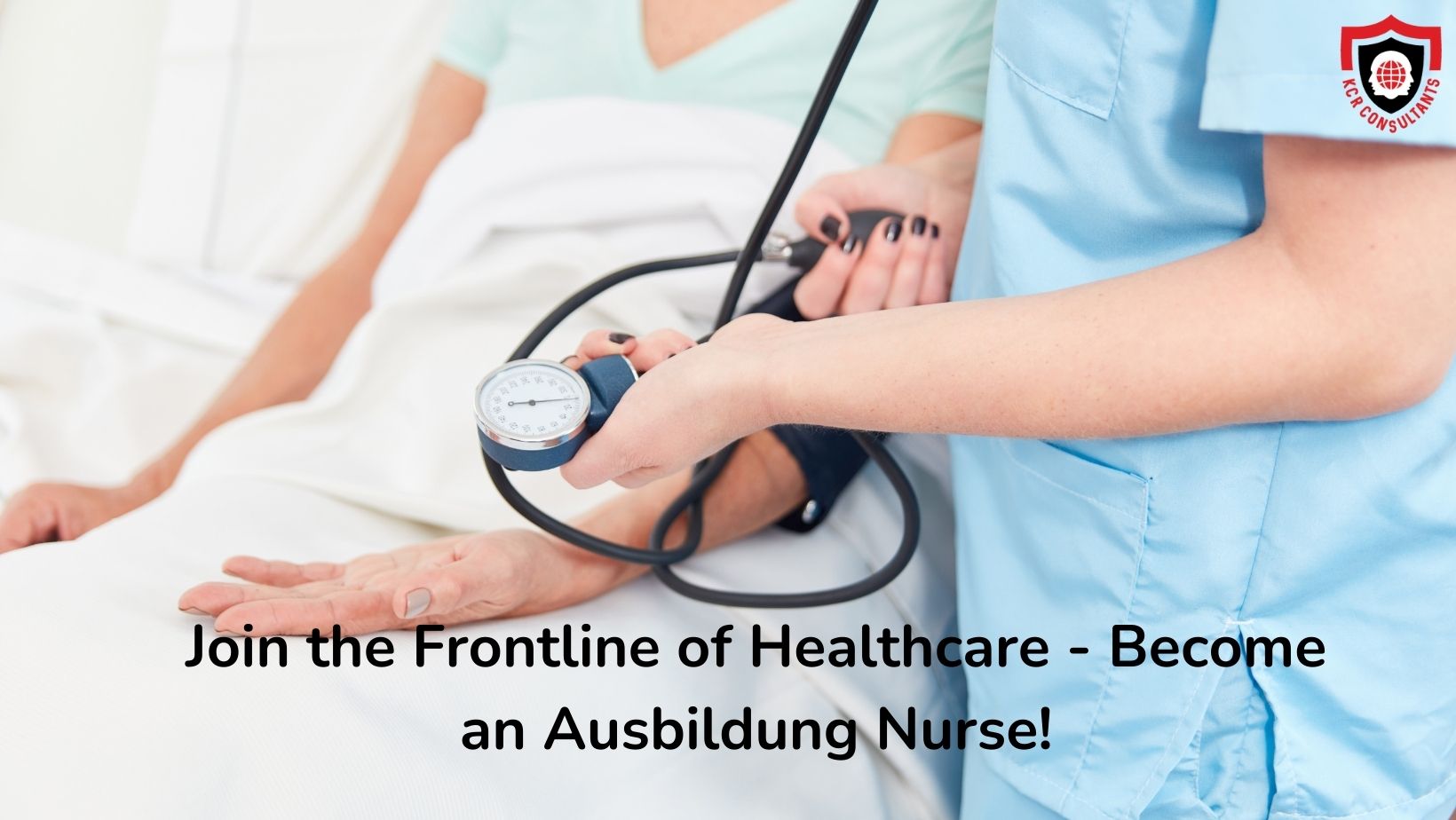A Career in Nursing through Ausbildung in Germany: A Guide to Success
‘Ausbildung Nursing’ in Germany is a cornerstone of the healthcare system, representing specialized vocational training to prepare the attendees for a career in nursing.
This dual education system is deeply integrated into the German healthcare sector, combining classroom instruction with hands-on clinical experience.
Through ‘Ausbildung Nursing,’ trainees gain comprehensive knowledge and skills for providing high-quality patient care.
The significance of ‘Ausbildung Nursing’ extends beyond mere skill acquisition; it is vital for addressing the growing demand for healthcare professionals in Germany.
With an increasing need for healthcare services and an aging population, ‘Ausbildung Nursing’ ensures a steady supply of well-trained nurses ready to meet the challenges of modern healthcare settings.
In a country known for its high standards of medical care, ‘Ausbildung Nursing’ programs are rigorous and respected, producing professionals who are not only technically proficient but also compassionate caregivers.
This program is essential for maintaining the quality of healthcare that Germany is known for and providing pathways for individuals to enter a noble and rewarding profession.
Understanding Ausbildung Nursing
‘Ausbildung Nursing’ in Germany entails a rigorous vocational training program that epitomizes the country’s esteemed dual education system.
This approach to nursing education is a blend of theoretical classroom instruction and extensive practical workplace training.
Over three years, the standard duration for the program, Ausbildung nursing students split their time between vocational schools (Berufsschule) and healthcare facilities, where they apply their classroom learning to real-world nursing scenarios.
The vocational schools provide the theoretical backbone of the training, covering subjects such as anatomy, physiology, nursing ethics and pharmacology. This is complemented by periods of hands-on experience in hospitals, clinics, or other healthcare settings, where students learn under the supervision of experienced nursing professionals.
This practical aspect is crucial as it equips students with the skills required to excel in nursing, from patient care to operating medical equipment and emergency response.
A distinctive feature of the Ausbildung nursing program is its recognition by the German government, ensuring that the curriculum meets the high standards required for healthcare professionals in Germany.
Upon completion of the program, graduates receive a state-recognized nursing qualification, which is highly regarded and opens doors to employment opportunities throughout Germany and the European Union.
This dual system, intrinsic to Ausbildung nursing, is highly effective in preparing competent nurses.
It provides a comprehensive education that fosters both the technical abilities and the interpersonal skills necessary to succeed in the nursing profession.
The system benefits the trainees by providing them a clear pathway into a stable career. It bolsters the healthcare system by ensuring a consistent influx of well-trained nursing professionals.
The Path to Becoming an Ausbildung Nurse
The journey to becoming a nurse through the Ausbildung system in Germany is a structured and multi-faceted process that lays a solid foundation for a career in nursing.
Step 1: Meeting the Requirements
Prospective Ausbildung nurses must first meet specific educational requirements, typically a secondary school diploma or equivalent.
Some schools may also require a particular grade point average or prior experience in a related healthcare setting, such as a volunteer position or an internship.
Step 2: Application
The next step involves applying to a vocational school that offers the Ausbildung nursing program.
Applications should include:
- Academic transcripts.
- Proof of any relevant experience.
- Sometimes, a personal statement or a letter of motivation.
Candidates may also need to pass an entrance examination or an interview as part of the selection process.

Step 3: Enrollment in a Vocational School
Once accepted, students enroll in a vocational school (Berufsschule) where they will spend part of their time learning theoretical aspects of nursing.
This includes biology, nutrition, healthcare law and patient care courses.
Step 4: Practical Training
Alongside classroom learning, students must complete practical training in a healthcare facility such as a hospital, clinic, or nursing home.
During this period, they gain hands-on experience under the supervision of qualified healthcare professionals, learning essential nursing skills.
Step 5: State Examination
After completing the theoretical and practical components of the Ausbildung nursing program, students must pass a state examination.
This exam assesses their knowledge and skills and successful candidates are awarded a nursing license.
Step 6: Entry into the Workforce
With the state examination cleared and the nursing license obtained, graduates are qualified to enter the workforce as professional nurses.
They may choose to work in various healthcare settings or pursue further specialization in areas of interest.
The Ausbildung nursing pathway ensures graduates are well-prepared for the demands of the nursing profession, with a combination of knowledge and practical experience highly valued in the healthcare industry.
Benefits of Pursuing Ausbildung Nursing
Pursuing Ausbildung Nursing in Germany has many benefits, including the extensive hands-on experience gained through the program.
This practical approach ensures that students graduate with the confidence and skills to provide high-quality patient care from day one.
The direct application of theoretical knowledge in real-world settings allows Ausbildung nurses to refine their skills under the guidance of seasoned professionals, bridging the gap between learning and practicing.
Another significant advantage is the job security associated with a career in nursing.
Due to the ever-present demand for healthcare services and the current shortage of healthcare professionals, nursing jobs are abundant.
This demand translates into stable career prospects for Ausbildung nursing graduates.
Moreover, the aging population in Germany further secures the long-term need for skilled nursing professionals.
The Ausbildung Nursing program also provides a strong foundation for career advancement.
Graduates can specialize in fields such as pediatric nursing, anesthesia, or oncology, to name a few.
Additional certifications and advanced training can lead to positions with greater responsibility, such as head nurse or healthcare manager.
For those interested in further education, the pathway to advanced degrees like a Bachelor’s or Master’s in Nursing is also an option, which can lead to roles in research, teaching, or advanced clinical practice.
Additionally, the globally recognized credentials of the German Ausbildung Nursing program open up international job opportunities.
Graduates can leverage their qualifications to work in various healthcare systems worldwide, making it an attractive option for those looking to work abroad.
In essence, Ausbildung Nursing is not just a pathway to becoming a nurse; it’s a stepping stone to a fulfilling career with excellent job security, diverse opportunities for specialization and advancement and the potential for international career development.
Ausbildung Nursing Curriculum and Specializations
The Ausbildung Nursing curriculum in Germany is a meticulously designed framework that provides comprehensive training in the field of nursing.
The coursework combines theoretical instruction and clinical practice, ensuring students develop a thorough understanding of nursing principles and hands-on skills.
Coursework
The theoretical component of the Ausbildung Nursing program covers a wide range of subjects critical to the nursing profession.
Students delve into anatomy and physiology to understand the human body’s functioning, while courses in pathology and pharmacology provide insight into disease processes and medication management.
Nursing ethics and healthcare law are also integral parts of the curriculum, equipping students with the knowledge to navigate patient care’s moral and legal aspects.
Clinical Rotations
Clinical rotations are a core element of the Ausbildung Nursing program, allowing students to apply their theoretical knowledge practically.
These rotations occur in various departments, such as general medicine, surgery, pediatrics and psychiatry, providing exposure to different specialties and patient populations.
Under the supervision of qualified and experienced nurses and medical staff, students learn to perform nursing duties, develop patient care plans and work as part of a healthcare team.
Areas of Specialization
After completing the general Ausbildung Nursing program, graduates can specialize in areas that align with their interests and career goals.
Specializations can include geriatric nursing, pediatric nursing, operating room nursing, or critical care nursing.
Each field requires additional training and certification, allowing nurses to become experts in a specific area of healthcare.
Specializing enables nurses to take on more focused roles in the healthcare system, often with increased responsibilities and the potential for higher compensation.
It also contributes to the overall quality of healthcare, as specialized nurses bring a depth of knowledge and expertise to their practice.
The Ausbildung Nursing curriculum and specializations are designed to create a competent, versatile nursing workforce capable of meeting the diverse needs of the healthcare system in Germany and beyond.
Challenges and Rewards of Ausbildung Nursing
Challenges and profound rewards mark the path through Ausbildung Nursing.
Students embarking on this journey must navigate a demanding curriculum that requires dedication, adaptability and resilience.
The intensity of the coursework and the high expectations during clinical rotations can be challenging, as students must assimilate a vast amount of knowledge and quickly apply it within clinical settings.
Balancing the rigors of academic study with the practical demands of nursing, all while maintaining personal well-being, can be a test of endurance and commitment.
Additionally, nursing students must develop a strong emotional constitution to cope with healthcare’s often stressful and emotionally charged nature.
They must hone their interpersonal skills to communicate effectively with patients, their families, colleagues and other healthcare professionals.
Managing the emotional impact of patient care, especially in areas like palliative care or emergency medicine, is another challenge that Ausbildung Nursing students face.
Despite these challenges, the rewards of completing Ausbildung Nursing are significant.
Professionally, graduates enter a field with a high demand for skilled nurses, offering job security and numerous opportunities for career advancement.
The satisfaction of providing essential care and making a tangible difference in patients’ lives is a powerful motivator and source of professional pride.
On a personal level, Ausbildung Nursing graduates gain versatile skills and experiences that benefit them beyond their professional lives.
They develop solid problem-solving abilities, emotional intelligence and a capacity for empathetic communication.
Additionally, the program’s structure fosters a sense of camaraderie and teamwork among students, often leading to lasting friendships and professional networks.
Ultimately, the journey through Ausbildung Nursing is one of profound personal and professional growth, with the outcome being a fulfilling career dedicated to serving others in one of the most respected professions.
Ausbildung Nursing and the German Healthcare System
Ausbildung nurses are an integral part of the German healthcare system, serving as its backbone in many respects.
Within this framework, they perform various roles essential to the functioning of healthcare services, from patient care and treatment to support for families and education about health maintenance and disease prevention.
The German healthcare system, known for its efficiency and high standards of care, relies on the well-rounded expertise that Ausbildung nurses bring.
These nurses are trained to adapt quickly to different medical settings, work with diverse patient populations, and respond to the dynamic demands of healthcare delivery.
Their comprehensive education enables them to perform various tasks, including administering medications, assisting with medical procedures, and collaborating with other healthcare professionals in developing patient care plans.
The role of Ausbildung nurses also extends to preventative care and public health.
They are often involved in community health initiatives, health education programs, and early intervention strategies, which are vital in promoting the population’s overall well-being.
Ausbildung nurses are indispensable team members in hospitals, providing around-the-clock care and ensuring patient needs are met promptly and effectively.
They often serve as patients’ primary point of contact, playing a crucial role in monitoring patient progress and providing feedback to doctors and other healthcare providers.
The training and professional ethos instilled in Ausbildung nurses also emphasizes patient-centered care, a core value of the German healthcare system.
This patient-focused approach ensures that care delivery is both medically proficient and compassionate and tailored to individual patient needs.
As the healthcare landscape evolves, particularly with technological advances and the growing emphasis on personalized medicine, Ausbildung nurses are expected to update their skills and knowledge continuously.
This ongoing professional development is critical to maintaining the high quality of healthcare that Germany is known for and addressing future healthcare delivery challenges.
The investment in Ausbildung Nursing is thus an investment in the strength and sustainability of the German healthcare system.
Future Prospects and Continuing Education in Ausbildung Nursing
The future job market for Ausbildung Nursing graduates in Germany appears robust and promising.
With an increasing aging population and the demand for more healthcare services, the need for well-trained nurses is expected to grow.
Ausbildung Nursing graduates are well-positioned to take advantage of this trend, with opportunities across various healthcare settings, including hospitals, outpatient clinics, nursing homes, and home healthcare services.
The scope for specialization within nursing is vast and continues to expand. Graduates can further their expertise in geriatric nursing, pediatric care, oncology, palliative care, or anesthesia.
Each specialty enhances the nurse’s skill set, increases their value within the healthcare system, and can lead to higher earning potential.
Continuing education is crucial for those looking to advance in their careers.
The German education system facilitates lifelong learning and professional development, offering various pathways for nurses to further their education.
Options include part-time study programs, distance learning, and intensive courses that lead to additional qualifications or a degree in nursing.
These programs are designed for working professionals, often leading to advanced roles such as nurse practitioners, clinical nurse specialists, or management positions within healthcare institutions.
Moreover, with a nursing qualification recognized across the European Union, Ausbildung Nursing graduates have the potential to pursue international career opportunities.
This cross-border mobility is attractive for nurses seeking a broad range of experiences and professional growth.
In public health and research, there are opportunities for Ausbildung Nursing graduates to contribute to health policy, educational programs, and innovative healthcare solutions.
These roles leverage the nurse’s unique perspective and expertise to impact healthcare at a systemic level.
In summary, the future for Ausbildung Nursing graduates is filled with opportunities for career advancement, specialization, and personal development.
The ongoing need for skilled nursing professionals ensures that their skills will be in demand, while the German education system provides the necessary support for their continuous professional growth.
Related Articles









